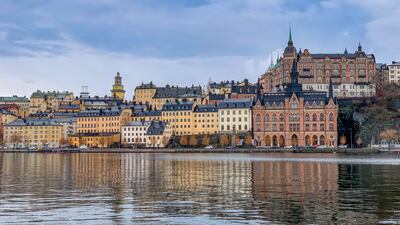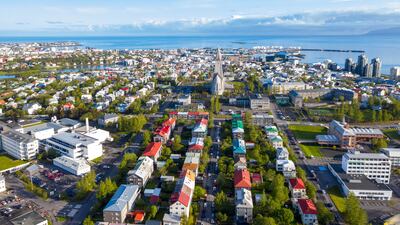Switzerland tops the world for attracting and retaining talent, and the UAE leads the Arab world, according to the 2022 IMD World Talent Ranking.
While Switzerland remained the leader among 63 economies in attracting and retaining talent for the sixth consecutive year, it was followed by the Nordic countries of Sweden, Iceland, Norway and Denmark, according to the index by the World Competitiveness Centre (WCC).
Finland ranked sixth for attracting top talent in 2022, Luxembourg dropped to seventh place, while Austria slipped to eighth. The Netherlands and Germany remain ninth and 10th, respectively.
Colombia, Mongolia and Venezuela ranked the weakest among 63 countries for attraction and retention of talent, according to the ranking.
Watch: some stats behind the UAE's hiring boom
The UAE climbed two places to rank 21st globally, while Saudi Arabia was 30th, Qatar 34th and Bahrain 35th.
The annual report considered factors such as remuneration, taxes, cost of living, the education system, as well as the economy’s position on environmental issues and a fair judicial system.
“Talent competitiveness in the post-Covid period hinges greatly on the motivation level of the workforce, which, in turn, relies on remuneration but also quality of life and organisational leadership of the economy,” said Christos Cabolis, chief economist at the WCC.
In recent years, the UAE has undertaken several economic, legal and social reforms to attract skilled workers.
The government’s overhaul of visa programmes has boosted opportunities for foreign workers to live and work in the country. That includes a revamp of the 10-year golden visa to simplify eligibility criteria and expand the categories of beneficiaries.
The green visa was also introduced to provide five-year residency to skilled workers without needing a sponsor or employer.
The UAE also recently implemented a new unemployment insurance programme for federal government and private sector employees, to which all workers must subscribe from January 1, 2023.
It will pay Emiratis and residents in the private and public sectors a cash sum for a maximum of three months if they lose their jobs.
The WTR report gauged 63 countries based on three factors: investment and development, which considers the domestic resources committed to cultivate home-grown talent; appeal, which evaluates the ability to attract and retain talent from international and domestic markets; and readiness, which quantifies the quality of available skills and competencies in the talent pool.
“Covid-19 has had a profound impact on skilled individuals’ decisions to leave a particular country,” Mr Cabolis said.
“Faced with this crippling of talent’s mobility, the economies that subsequently strengthened their quality of life as well as their commitment to environmental issues managed to boost their appeal, which benefitted their talent competitiveness.”
Saudi Arabia, which climbed eight places since 2021, was the economy that improved its appeal to talent most between 2019 and 2022 among the 63 studied, the research found.
This was attributed to a decrease in the cost of living, an increase in quality-of-life scores and ambitious investment plans.
The Czech Republic, Croatia, Slovakia and Mongolia also improved their rankings.
Top 15 companies to work for in the UAE, according to LinkedIn — in pictures
While Western Europe led across all three assessing factors in the study, Eastern Asian economies performed well in the investment and development and readiness factors.
North America, meanwhile, was second in the appeal factor.
In contrast, former CIS (Commonwealth of Independent States) and Central Europe together with South America lag behind other regions as they struggle to sustain favourable conditions for talent retention and attraction, the study found.
Switzerland ranked first in investment and development and in appeal, and second in readiness.
It ranked first in the effective implementation of apprenticeships, attracting highly skilled foreign personnel and the availability of finance skills and of managers with international experience.
chief economist, WCC
The country ranked second in the prioritisation of employee training by the private sector, the level of motivation of the labour force and the availability of language skills, according to the research.
There is, however, room for improvement in quality of education, the female labour force, graduates in science, and exposure to particle pollution, which forms part of the appeal factor, the study found.
Sweden held on to second spot by performing strongly in appeal.
The UAE ranked seventh globally for readiness of available talent, 15th for appeal among international and domestic professionals, and 45th for investment and development in domestic talent.
The Arab world’s second-biggest economy ranked high for investment in health infrastructure, pupil-teacher ratio, quality of life, attracting foreign highly skilled personnel, presence of skilled labour and the availability of finance skills, senior managers with international experience as well as science graduates, the report said.


























